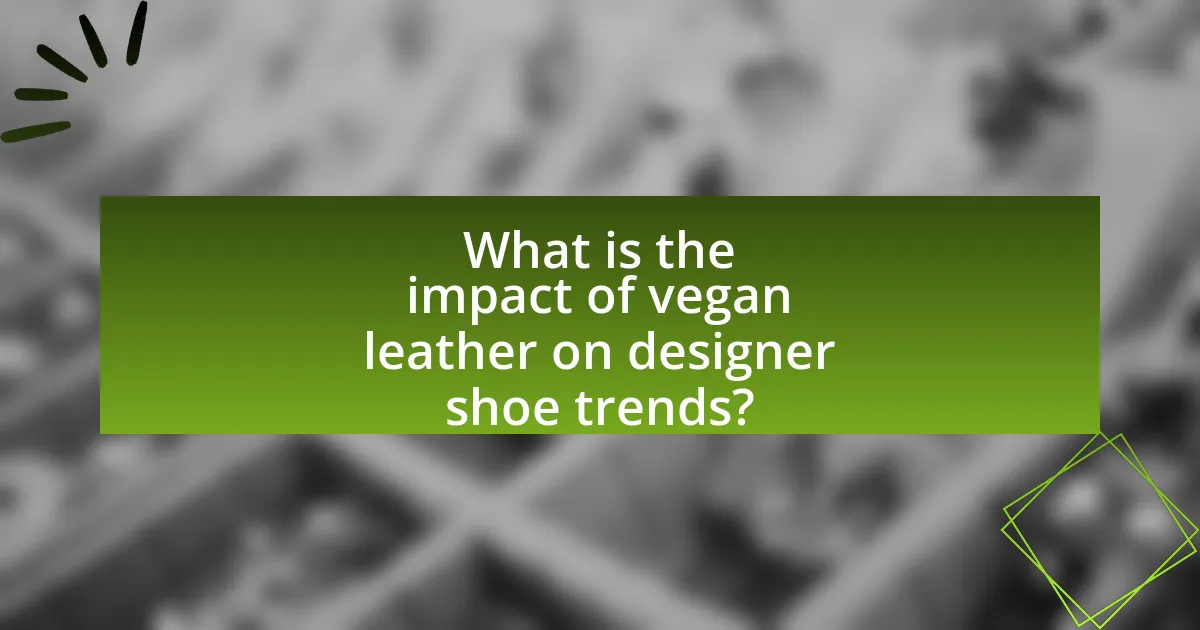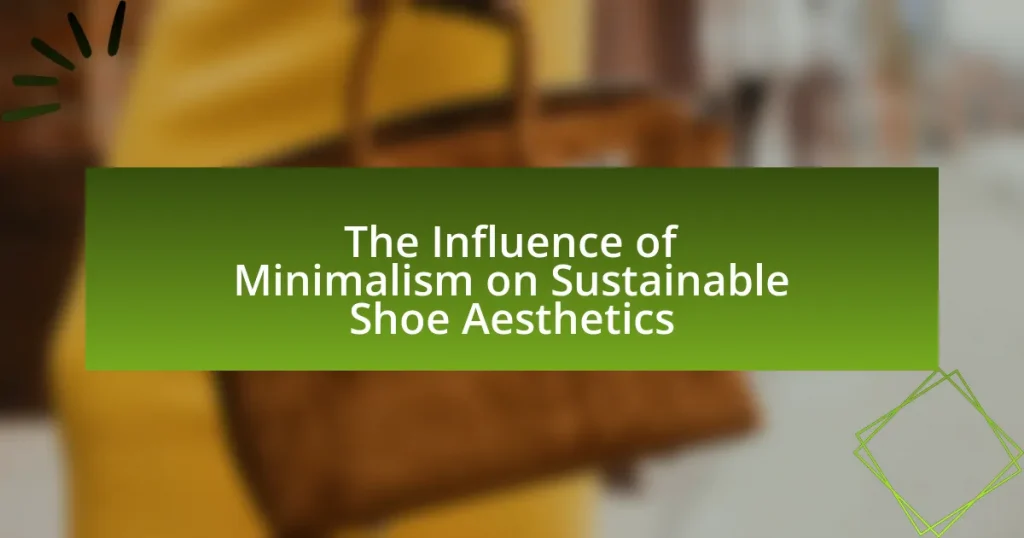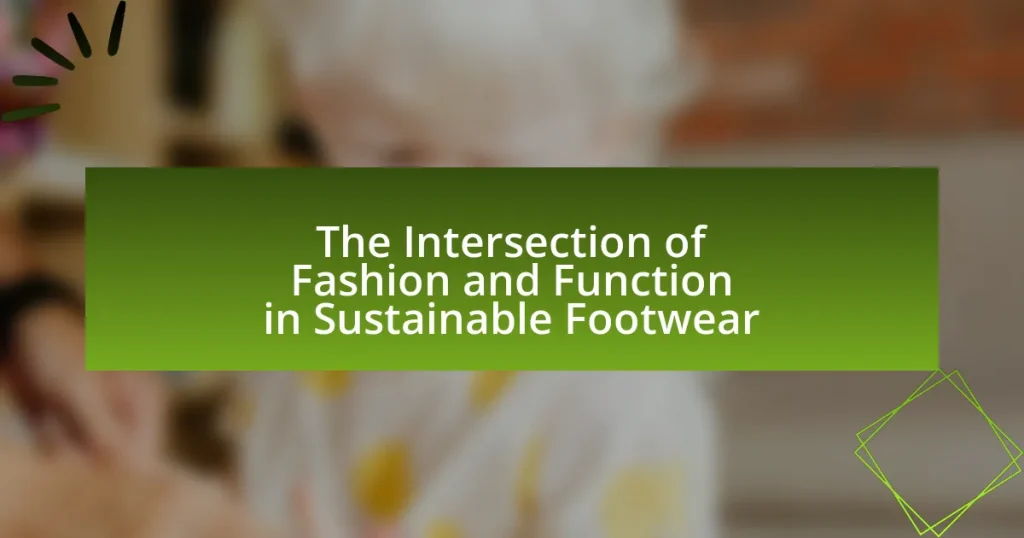The article examines the significant impact of vegan leather on designer shoe trends, highlighting its role in promoting sustainability and ethical fashion. It discusses how luxury brands, such as Stella McCartney and Gucci, are integrating vegan leather into their collections in response to rising consumer demand for environmentally friendly products. Key factors driving this trend include increased consumer awareness of animal welfare, environmental sustainability, and the ethical fashion movement. The article also explores the challenges designers face when using vegan leather, the implications for pricing, and emerging trends in the market, emphasizing the importance of informed consumer choices in supporting sustainable practices.

What is the impact of vegan leather on designer shoe trends?
Vegan leather significantly influences designer shoe trends by promoting sustainability and ethical fashion choices. As consumer demand for environmentally friendly products rises, many luxury brands are incorporating vegan leather into their collections, reflecting a shift towards more sustainable materials. For instance, brands like Stella McCartney and Gucci have embraced vegan leather, showcasing its versatility and appeal in high-fashion contexts. This trend is supported by a 2021 report from Grand View Research, which projected the global vegan leather market to reach $89.6 billion by 2025, indicating a growing acceptance and integration of vegan materials in the fashion industry.
How has the rise of vegan leather influenced consumer preferences?
The rise of vegan leather has significantly influenced consumer preferences by increasing demand for sustainable and ethical fashion choices. As consumers become more environmentally conscious, they are opting for vegan leather products, which are often perceived as more eco-friendly compared to traditional leather. A study by the Global Fashion Agenda in 2021 indicated that 66% of consumers are willing to pay more for sustainable brands, highlighting a shift towards prioritizing sustainability in purchasing decisions. This trend is further supported by the growing availability of high-quality vegan leather alternatives, which appeal to consumers seeking both style and ethical considerations in their footwear choices.
What are the key factors driving the demand for vegan leather in footwear?
The key factors driving the demand for vegan leather in footwear include increasing consumer awareness of animal welfare, environmental sustainability concerns, and the rise of ethical fashion trends. Consumer awareness has led to a preference for cruelty-free products, with a significant portion of the market actively seeking alternatives to traditional leather. Environmental sustainability is also a major driver, as vegan leather often has a lower carbon footprint and reduced water usage compared to animal leather production. Additionally, the ethical fashion movement promotes transparency and responsible sourcing, further fueling interest in vegan leather options. According to a report by Grand View Research, the global vegan leather market is expected to reach $89.6 billion by 2025, highlighting the growing consumer demand for sustainable and ethical footwear choices.
How do ethical considerations shape consumer choices in designer shoes?
Ethical considerations significantly influence consumer choices in designer shoes by driving demand for sustainable and cruelty-free options. Consumers increasingly prioritize brands that demonstrate social responsibility, such as those using vegan leather, which eliminates animal cruelty and reduces environmental impact. A study by the Global Fashion Agenda found that 66% of global consumers are willing to pay more for sustainable brands, highlighting the growing importance of ethical practices in purchasing decisions. This shift towards ethical consumption is reshaping the designer shoe market, as brands that adopt sustainable materials and transparent supply chains attract a more conscientious consumer base.
What role do designers play in the adoption of vegan leather?
Designers play a crucial role in the adoption of vegan leather by influencing consumer perceptions and trends through innovative designs and sustainable practices. Their creative vision helps to elevate vegan leather as a desirable alternative to traditional materials, showcasing its versatility and aesthetic appeal in high-fashion contexts. For instance, major fashion houses like Stella McCartney have successfully integrated vegan leather into their collections, demonstrating that sustainable materials can meet luxury standards. This shift not only attracts environmentally conscious consumers but also encourages other designers to explore and adopt vegan leather, thereby expanding its market presence and acceptance within the fashion industry.
How are designers incorporating vegan leather into their collections?
Designers are incorporating vegan leather into their collections by utilizing innovative materials that mimic the look and feel of traditional leather while being environmentally friendly. Many brands are now sourcing plant-based alternatives, such as pineapple leather, mushroom leather, and recycled plastics, to create stylish and sustainable footwear. For instance, brands like Stella McCartney and Veja have successfully integrated these materials into their designs, showcasing both aesthetic appeal and ethical responsibility. This shift not only aligns with consumer demand for sustainable fashion but also reflects a growing trend in the industry towards reducing reliance on animal products, as evidenced by a 2021 report from the Fashion Institute of Technology, which highlighted a significant increase in the use of vegan materials among leading fashion houses.
What challenges do designers face when using vegan leather?
Designers face several challenges when using vegan leather, primarily related to material performance, consumer perception, and sustainability. The performance of vegan leather can vary significantly, with some alternatives lacking the durability and texture of traditional leather, which can affect the overall quality of the final product. Additionally, consumer perception often associates vegan leather with lower quality, which can impact sales and brand reputation. Furthermore, while vegan leather is marketed as a more sustainable option, the production processes for some synthetic alternatives can involve environmentally harmful practices, complicating the sustainability narrative. These challenges necessitate careful selection of materials and transparent communication with consumers to ensure that the benefits of vegan leather are effectively conveyed.
Why is sustainability important in the context of designer shoes?
Sustainability is important in the context of designer shoes because it addresses environmental concerns and consumer demand for ethical practices. The fashion industry, particularly footwear, significantly contributes to pollution and waste, with the production of traditional leather shoes involving harmful chemicals and high carbon emissions. According to a 2021 report by the United Nations, the fashion industry accounts for about 10% of global carbon emissions, highlighting the urgent need for sustainable alternatives. By adopting sustainable practices, such as using vegan leather, designer brands can reduce their ecological footprint, appeal to environmentally conscious consumers, and promote a more responsible approach to fashion.
How does vegan leather contribute to sustainable fashion practices?
Vegan leather contributes to sustainable fashion practices by offering an alternative to traditional animal leather, which often involves environmentally harmful processes. The production of vegan leather typically utilizes materials such as polyurethane or recycled plastics, which can reduce the carbon footprint associated with livestock farming and leather tanning. For instance, a study by the University of California found that producing synthetic leather can result in up to 90% lower greenhouse gas emissions compared to animal leather. Additionally, vegan leather often incorporates recycled materials, further promoting circular fashion principles by minimizing waste and resource consumption.
What are the environmental impacts of traditional leather versus vegan leather?
Traditional leather production has significant environmental impacts, including high water usage, deforestation, and pollution from tanning processes. For instance, producing one cowhide can require over 15,000 liters of water, and the tanning process often involves toxic chemicals that can contaminate local water sources. In contrast, vegan leather, often made from synthetic materials like polyurethane or natural materials like cork, generally has a lower carbon footprint and does not involve animal agriculture, which is a major contributor to greenhouse gas emissions. However, some synthetic vegan leathers can still have environmental drawbacks, such as microplastic pollution and reliance on fossil fuels. Overall, while vegan leather can reduce certain environmental impacts associated with traditional leather, it is essential to consider the specific materials and production methods used in each case.
How does vegan leather affect the pricing of designer shoes?
Vegan leather generally lowers the pricing of designer shoes compared to traditional leather. This is primarily due to the reduced production costs associated with synthetic materials, which are often less expensive to source and manufacture than animal-derived leather. For instance, a report by the Business of Fashion indicates that the cost of producing synthetic leather can be up to 30% lower than that of genuine leather, allowing brands to offer more competitively priced products. Additionally, as consumer demand for sustainable and cruelty-free options increases, brands may adopt vegan leather to attract a broader market, further influencing pricing strategies.
What are the cost implications of using vegan leather in production?
The cost implications of using vegan leather in production generally involve higher initial material costs compared to traditional leather. Vegan leather, often made from synthetic materials or plant-based sources, can range from 20% to 50% more expensive than conventional leather due to the advanced technology and sustainable practices required for its production. For instance, a study by the University of California found that while the production of synthetic leather can be costlier upfront, it may lead to lower long-term costs due to reduced environmental impact and potential savings in waste management. Additionally, brands adopting vegan leather may attract a growing consumer base willing to pay a premium for sustainable products, potentially offsetting the higher production costs.
How do consumers perceive the value of vegan leather shoes compared to traditional options?
Consumers generally perceive vegan leather shoes as offering comparable or superior value to traditional leather options, primarily due to ethical considerations and environmental sustainability. A survey conducted by the market research firm Statista in 2021 indicated that 66% of consumers prioritize sustainability in their purchasing decisions, which enhances the perceived value of vegan leather. Additionally, vegan leather often comes at a lower price point than traditional leather, making it more accessible to a broader audience. This combination of ethical appeal and affordability contributes to a positive perception of vegan leather shoes among consumers, particularly among younger demographics who are more environmentally conscious.
What trends are emerging in the designer shoe market due to vegan leather?
Emerging trends in the designer shoe market due to vegan leather include increased consumer demand for sustainable materials, innovative design techniques, and a shift towards ethical branding. The rise of eco-conscious consumers has led brands to prioritize vegan leather, which is often made from recycled materials or plant-based sources, thereby reducing environmental impact. Additionally, designers are experimenting with new textures and styles that highlight the versatility of vegan leather, appealing to a broader audience. According to a report by Grand View Research, the global vegan leather market is expected to reach $89.6 billion by 2025, indicating a significant shift in consumer preferences towards cruelty-free and sustainable fashion options.
How are fashion shows and events showcasing vegan leather footwear?
Fashion shows and events are increasingly showcasing vegan leather footwear by featuring collections from designers who prioritize sustainable materials. Major fashion weeks, such as New York and Paris, have included vegan leather brands in their lineups, highlighting the growing demand for eco-friendly alternatives. For instance, brands like Stella McCartney and Veja have prominently displayed vegan leather shoes, demonstrating their commitment to sustainability. This trend is supported by consumer interest in ethical fashion, with a 2021 survey indicating that 66% of global consumers are willing to pay more for sustainable products.
What innovative designs are being created with vegan leather?
Innovative designs being created with vegan leather include eco-friendly sneakers, high-fashion handbags, and sustainable footwear collections. Brands like Stella McCartney and Veja are leading the way by utilizing materials such as pineapple leather and apple leather, which not only reduce environmental impact but also offer unique textures and aesthetics. For instance, Stella McCartney’s use of Mylo, a mushroom-based leather alternative, showcases how vegan leather can be both stylish and sustainable, appealing to environmentally conscious consumers. These designs reflect a growing trend in the fashion industry towards sustainability while maintaining high-quality craftsmanship and modern aesthetics.
How can consumers make informed choices about vegan leather shoes?
Consumers can make informed choices about vegan leather shoes by researching the materials used, understanding the manufacturing processes, and evaluating the brand’s sustainability practices. Knowledge of materials is crucial; for instance, some vegan leathers are made from polyurethane, while others use more sustainable options like pineapple leather or apple leather. Additionally, consumers should investigate the production methods to ensure ethical labor practices are followed. Brands that are transparent about their sourcing and manufacturing processes often provide certifications or third-party verifications, which can serve as proof of their commitment to sustainability. By considering these factors, consumers can select vegan leather shoes that align with their values and preferences.
What should consumers look for when purchasing vegan leather footwear?
Consumers should look for the material composition and certifications when purchasing vegan leather footwear. High-quality vegan leather is often made from materials like polyurethane or recycled plastics, which can offer durability and a leather-like feel. Certifications such as PETA-approved or Global Organic Textile Standard (GOTS) indicate ethical production practices and environmental sustainability. Additionally, consumers should consider the brand’s transparency regarding sourcing and manufacturing processes, as this reflects the commitment to ethical standards in the vegan leather industry.
How can consumers support brands that prioritize vegan leather in their collections?
Consumers can support brands that prioritize vegan leather by choosing to purchase products made from this material. By actively selecting vegan leather items, consumers signal to brands that there is a demand for sustainable and cruelty-free alternatives. Research indicates that the global vegan leather market is projected to grow significantly, reaching approximately $89 billion by 2025, which demonstrates increasing consumer interest in ethical fashion choices. Additionally, consumers can engage with brands on social media, share their preferences, and advocate for vegan leather options, further influencing brand strategies and product offerings.



